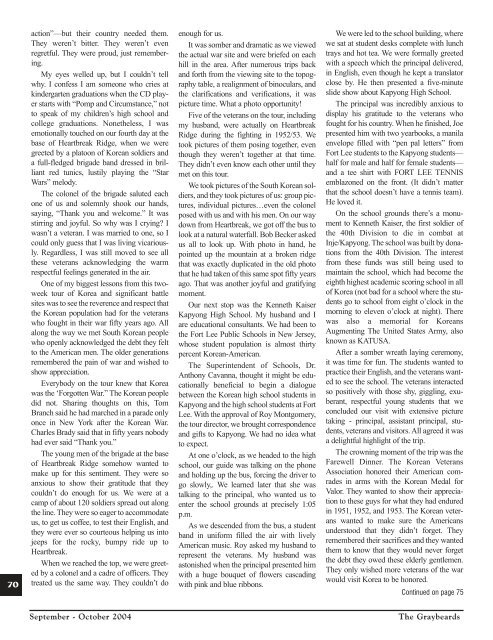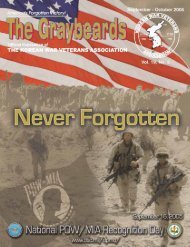Sep/Oct 2004 Graybeards - KWVA - Korean War Veterans Association
Sep/Oct 2004 Graybeards - KWVA - Korean War Veterans Association
Sep/Oct 2004 Graybeards - KWVA - Korean War Veterans Association
Create successful ePaper yourself
Turn your PDF publications into a flip-book with our unique Google optimized e-Paper software.
70<br />
action”—but their country needed them.<br />
They weren’t bitter. They weren’t even<br />
regretful. They were proud, just remembering.<br />
My eyes welled up, but I couldn’t tell<br />
why. I confess I am someone who cries at<br />
kindergarten graduations when the CD player<br />
starts with “Pomp and Circumstance,” not<br />
to speak of my children’s high school and<br />
college graduations. Nonetheless, I was<br />
emotionally touched on our fourth day at the<br />
base of Heartbreak Ridge, when we were<br />
greeted by a platoon of <strong>Korean</strong> soldiers and<br />
a full-fledged brigade band dressed in brilliant<br />
red tunics, lustily playing the “Star<br />
<strong>War</strong>s” melody.<br />
The colonel of the brigade saluted each<br />
one of us and solemnly shook our hands,<br />
saying, “Thank you and welcome.” It was<br />
stirring and joyful. So why was I crying? I<br />
wasn’t a veteran. I was married to one, so I<br />
could only guess that I was living vicariously.<br />
Regardless, I was still moved to see all<br />
these veterans acknowledging the warm<br />
respectful feelings generated in the air.<br />
One of my biggest lessons from this twoweek<br />
tour of Korea and significant battle<br />
sites was to see the reverence and respect that<br />
the <strong>Korean</strong> population had for the veterans<br />
who fought in their war fifty years ago. All<br />
along the way we met South <strong>Korean</strong> people<br />
who openly acknowledged the debt they felt<br />
to the American men. The older generations<br />
remembered the pain of war and wished to<br />
show appreciation.<br />
Everybody on the tour knew that Korea<br />
was the ‘Forgotten <strong>War</strong>.” The <strong>Korean</strong> people<br />
did not. Sharing thoughts on this, Tom<br />
Branch said he had marched in a parade only<br />
once in New York after the <strong>Korean</strong> <strong>War</strong>.<br />
Charles Brady said that in fifty years nobody<br />
had ever said “Thank you.”<br />
The young men of the brigade at the base<br />
of Heartbreak Ridge somehow wanted to<br />
make up for this sentiment. They were so<br />
anxious to show their gratitude that they<br />
couldn’t do enough for us. We were at a<br />
camp of about 120 soldiers spread out along<br />
the line. They were so eager to accommodate<br />
us, to get us coffee, to test their English, and<br />
they were ever so courteous helping us into<br />
jeeps for the rocky, bumpy ride up to<br />
Heartbreak.<br />
When we reached the top, we were greeted<br />
by a colonel and a cadre of officers. They<br />
treated us the same way. They couldn’t do<br />
enough for us.<br />
It was somber and dramatic as we viewed<br />
the actual war site and were briefed on each<br />
hill in the area. After numerous trips back<br />
and forth from the viewing site to the topography<br />
table, a realignment of binoculars, and<br />
the clarifications and verifications, it was<br />
picture time. What a photo opportunity!<br />
Five of the veterans on the tour, including<br />
my husband, were actually on Heartbreak<br />
Ridge during the fighting in 1952/53. We<br />
took pictures of them posing together, even<br />
though they weren’t together at that time.<br />
They didn’t even know each other until they<br />
met on this tour.<br />
We took pictures of the South <strong>Korean</strong> soldiers,<br />
and they took pictures of us: group pictures,<br />
individual pictures…even the colonel<br />
posed with us and with his men. On our way<br />
down from Heartbreak, we got off the bus to<br />
look at a natural waterfall. Bob Becker asked<br />
us all to look up. With photo in hand, he<br />
pointed up the mountain at a broken ridge<br />
that was exactly duplicated in the old photo<br />
that he had taken of this same spot fifty years<br />
ago. That was another joyful and gratifying<br />
moment.<br />
Our next stop was the Kenneth Kaiser<br />
Kapyong High School. My husband and I<br />
are educational consultants. We had been to<br />
the Fort Lee Public Schools in New Jersey,<br />
whose student population is almost thirty<br />
percent <strong>Korean</strong>-American.<br />
The Superintendent of Schools, Dr.<br />
Anthony Cavanna, thought it might be educationally<br />
beneficial to begin a dialogue<br />
between the <strong>Korean</strong> high school students in<br />
Kapyong and the high school students at Fort<br />
Lee. With the approval of Roy Montgomery,<br />
the tour director, we brought correspondence<br />
and gifts to Kapyong. We had no idea what<br />
to expect.<br />
At one o’clock, as we headed to the high<br />
school, our guide was talking on the phone<br />
and holding up the bus, forcing the driver to<br />
go slowly,. We learned later that she was<br />
talking to the principal, who wanted us to<br />
enter the school grounds at precisely 1:05<br />
p.m.<br />
As we descended from the bus, a student<br />
band in uniform filled the air with lively<br />
American music. Roy asked my husband to<br />
represent the veterans. My husband was<br />
astonished when the principal presented him<br />
with a huge bouquet of flowers cascading<br />
with pink and blue ribbons.<br />
We were led to the school building, where<br />
we sat at student desks complete with lunch<br />
trays and hot tea. We were formally greeted<br />
with a speech which the principal delivered,<br />
in English, even though he kept a translator<br />
close by. He then presented a five-minute<br />
slide show about Kapyong High School.<br />
The principal was incredibly anxious to<br />
display his gratitude to the veterans who<br />
fought for his country. When he finished, Joe<br />
presented him with two yearbooks, a manila<br />
envelope filled with “pen pal letters” from<br />
Fort Lee students to the Kapyong students—<br />
half for male and half for female students—<br />
and a tee shirt with FORT LEE TENNIS<br />
emblazoned on the front. (It didn’t matter<br />
that the school doesn’t have a tennis team).<br />
He loved it.<br />
On the school grounds there’s a monument<br />
to Kenneth Kaiser, the first soldier of<br />
the 40th Division to die in combat at<br />
Inje/Kapyong. The school was built by donations<br />
from the 40th Division. The interest<br />
from these funds was still being used to<br />
maintain the school, which had become the<br />
eighth highest academic scoring school in all<br />
of Korea (not bad for a school where the students<br />
go to school from eight o’clock in the<br />
morning to eleven o’clock at night). There<br />
was also a memorial for <strong>Korean</strong>s<br />
Augmenting The United States Army, also<br />
known as KATUSA.<br />
After a somber wreath laying ceremony,<br />
it was time for fun. The students wanted to<br />
practice their English, and the veterans wanted<br />
to see the school. The veterans interacted<br />
so positively with those shy, giggling, exuberant,<br />
respectful young students that we<br />
concluded our visit with extensive picture<br />
taking - principal, assistant principal, students,<br />
veterans and visitors. All agreed it was<br />
a delightful highlight of the trip.<br />
The crowning moment of the trip was the<br />
Farewell Dinner. The <strong>Korean</strong> <strong>Veterans</strong><br />
<strong>Association</strong> honored their American comrades<br />
in arms with the <strong>Korean</strong> Medal for<br />
Valor. They wanted to show their appreciation<br />
to these guys for what they had endured<br />
in 1951, 1952, and 1953. The <strong>Korean</strong> veterans<br />
wanted to make sure the Americans<br />
understood that they didn’t forget. They<br />
remembered their sacrifices and they wanted<br />
them to know that they would never forget<br />
the debt they owed these elderly gentlemen.<br />
They only wished more veterans of the war<br />
would visit Korea to be honored.<br />
Continued on page 75<br />
<strong>Sep</strong>tember - <strong>Oct</strong>ober <strong>2004</strong><br />
The <strong>Graybeards</strong>

















